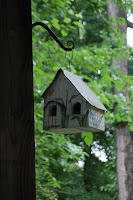Pokeweed is invasive. It's poisonous. It's huge. It spreads with underground suckers. (And yes, an underground sucker is a scary thing to behold. It's like a scene from an
Invasion of the Bodysnatchers film!)
Pokeweed has been my nemesis these past few gardening seasons. As my yard opened up to more sunlight, the poke was the first to make its persistent appearance. I have yanked on it. Whacked at it. Dug it out. And alerted my neighbors to its unholy, horrific conquest of our garden spaces. We are all now on constant vigilance. Even its genomic name is kind of frightening,
Phytolacca. It sounds like one of those unsightly aliens you'd meet in the Star Wars bar.
In Maryland, it's a native plant. In fact, it's native throughout eastern North America. It is a large-rooted perennial that can grow as high as 10 or more feet. Both the roots and the seeds are poisonous. You eat it, you convulse, you hurt, you hurl, you die. In late summer, the branches bear clusters of flowers and dark red fruits. The birds love the stuff and they feast on the berries and scatter them in every corner. It looks like nightshade (as in: "To be or Not To Be?") and so it's sometimes called American nightshade. It has other ignoble names like inkberry, pigeon berry, coakun, pocan bush, scoke, garget, and poke salad.
Now here's the rub, pokeweed might be so potent, it could be used as a cancer cure, or at least as a poultice, a kind of tumor analgesic. In other words, say we didn't have modern surgery and chemotherapy, and that lovely drug of mine, Tamoxifen. Back in the day, you could mix up a mash of polkweed and apply it to your sad, inflicted breast and perhaps stave off your inevitable death, or staunch your horrific pain long enough to have a few more happy moments with your friends and family.
In fact pokeweed is so potent, it's been used
historically for syphilis, diphtheria, conjunctivitis, and topically for scabies. If I was out gardening and fell, I could even use it for sprains or swellings. And when I'm old and arthritic, the berries, if I could manage to eat them without biting into the toxic seeds, might ease my pain. (One is taken the first day, two the second, up to 7 and back down to one.
)
And should I suddenly be moved to make art, poke berries make a beautiful purple die. Poke toxins might even prove helpful in controlling a nasty, invasive creature that is blocking our waterways, zebra mussels.
So here's my question. There's this monster pokeweed plant growing out at the far reaches of my now impenetrable meadow of asters, grasses, butterfly weed, Joe Pye weed and other happy natives? Is the poke friend or foe?
The Putterer
Postscript: The next day, I went in and took poke out. At its base, the plant had five thick stems, at least 2 1/2 inches in diameter. I sprayed the base with roundup. (I only ever use the stuff for the most difficult of weeds.) I couldn't even get my long-armed clippers around it. When the plant fell, it toppled like a building.

















